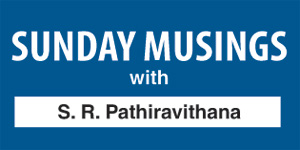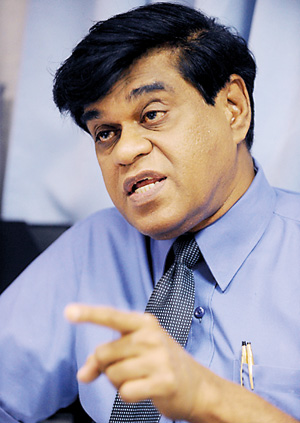Sports law needs another look
View(s):Former Nations Sports Council head and former National rugby football captain Dr. Maiya Gunasekera is of the view that the current impasse in the sports arena, where ambiguity is rife about the term of office at sports bodies, is only a misinterpretation of a word in a legal document and the whole scenario could be promptly cleared in no time if the Ministry of Sports expedites the matter.
 Speaking to the Sunday Times the sporting doctor explained, “I was the head of the Sports Council for about seven years, from Gamini Lokuge’s time to C.B. Ratnayake’s time. During that time the Sports Law was reviewed and revamped. Then, during Minister Lokuge’s time, we had a few meetings with the sports associations. When Mahindananda Aluthgamage took over as the minister, he said, ‘We should begin by meeting the Sports Associations’. So we held three rounds of meetings with all sports associations in the country. Then the inputs of all the associations were taken into consideration and the sports regulations were revamped.
Speaking to the Sunday Times the sporting doctor explained, “I was the head of the Sports Council for about seven years, from Gamini Lokuge’s time to C.B. Ratnayake’s time. During that time the Sports Law was reviewed and revamped. Then, during Minister Lokuge’s time, we had a few meetings with the sports associations. When Mahindananda Aluthgamage took over as the minister, he said, ‘We should begin by meeting the Sports Associations’. So we held three rounds of meetings with all sports associations in the country. Then the inputs of all the associations were taken into consideration and the sports regulations were revamped.
“Prior to this, the sports regulations had given the minister unlimited powers. Minister Aluthgamage did not want such powers. For instance, previously the minister could give permission for anyone to contest, after his or her stipulated period which was one to two years. Now after consultations were held with the associations – Dilan Perera, Dion Gomes and another person – and the Olympic Committee, they suggested that after the period of two years, you must have some criteria based on good governance, world ranking and whether the sport had developed. They wanted to appoint a committee to see, if the office bearers have done justice to their tasks and if so to give nominations. Then some recommended to make the term four years and some said to divide the period into to two 2-year terms and four years in total was enough.”
He said there were meaningful steps taken in concurrence with all the sports associations. Besides, he added that these regulations were also debated in parliament and passed unanimously.

Dr. Maiya Gunasekera
“I was present in parliament along with attorney-at-law Panduka Keerthinanda who was responsible of taking these documents to and fro in the legal field. The only matter that came up in parliament was that they suggested not only the owners of media institutions, but also the CEOs of such organisations should be made ineligible to hold office. They were all in agreement that after two years, the office bearer could continue subject to some assessment, thus reducing some of the powers of the minister”.
He said that when Sri Lanka won the Cricket World Cup in 1996 and when Sri Lanka won so many medals in international athletics, the then Sports Minister had wide powers.
“At the meetings (headed by Minister Aluthgamage) some of the powers that were vested in the minister were taken off”. There was a clause to say the minister at any time could send a secretary or one of his representatives to conduct a meeting of an association. That was removed. The Attorney General was of the view that it gave the minister too much power. So when the amendments were unanimously passed in parliament, the minister’s powers were reduced.”
Dr. Gunasekera said now he could not understand how people could complain about the powers of the minister, when NOC members were present and were a part of the process of removing some of the powers vested in him. He added that he firmly believes that the people’s representatives should have some powers vested in him. He argued that the sports associations have no public day. As a result, any one – may be an athlete or someone who is connected to the sport has no access to the hierarchy of the given sport. The only means left for them is to reach the relevant authorities through the people’s representative who has been voted in by them. “The minister’s job is to represent the people; we explained it to the IOC. If there is a dispute, are you going to courts? Are there lawyers who would represent you free of charge? That is a costly option. The dispute resolution has to be headed by the people’s representative – that is the minister, whoever he is. Then the minister can appoint a committee to probe the matter. These regulations were done to protect the people and the competitor; not the administrator.”
Dr. Gunasekera charged that some who were shouting on this issue once tried to come into positions of the Olympic Committee through certain associations, but, they couldn’t. Then the Musings asked him: If things are so clear, why are so many sports associations, including the rugby unions are in turmoil? Dr. Gunasekera explained, “Everything is in turmoil because of the wrong interpretation of the sports regulation.
 The term of office is for four years – to any one position. However, it was printed as any position. So when you look at the draft, the draft will say any one position. So what the minister should have done was, he should have called the associations and said ‘look these are your regulations, you have passed this. Did you ask for any position?’ Surely then they would have said any one position. It is obvious that it is a mistake. You can correct it immediately, without sticking to the letter. It even could be done now, it is stupid. It has to go to the AG, then it has to be approved, then it has to go through the relevant criteria. When you say four years, everyone thought it was right. Who is the regulator who is going to say the vice president after four years cannot be president? You know it is a mistake. If it is a mistake you have to go back to the associations and ask them if they want this changed.
The term of office is for four years – to any one position. However, it was printed as any position. So when you look at the draft, the draft will say any one position. So what the minister should have done was, he should have called the associations and said ‘look these are your regulations, you have passed this. Did you ask for any position?’ Surely then they would have said any one position. It is obvious that it is a mistake. You can correct it immediately, without sticking to the letter. It even could be done now, it is stupid. It has to go to the AG, then it has to be approved, then it has to go through the relevant criteria. When you say four years, everyone thought it was right. Who is the regulator who is going to say the vice president after four years cannot be president? You know it is a mistake. If it is a mistake you have to go back to the associations and ask them if they want this changed.
“What has happened here is today there is a different sports minister. If the previous government had passed a regulation in parliament, and if there is a mistake, you must go back to the associations and ask ‘look, is this a mistake and is this what you want?’ Then every association is sure to say it definitely is a mistake. They would say – we want four years in any one position. It is simple. This one-upmanship is stupid.
“When we went to Lausanne it was the same. Thank you for coming and you go back and resolve this on your own. The communiqué (see montage) calls for the respect of the law of the country and stipulates the minimum requirement of the IOC.”
“It is the people’s representative who should be held responsible. It is he who should be resolving the problems that come to him. Yes, independence must be given, but, in the name of independence we cannot take away the people’s rights.”
However, Dr. Gunasekera said issue over the four-year rule, which has become the prime focus in this present face-off between the Sports Minister, the sports associations and the Olympic Committee, could be resolved if the ministry authorities take steps to correct it.
Meanwhile, Attorney Panduka Keerthinanda took the argument a bit further by saying, “This amendment came into effect on January 15, 2013. So, the persons who held office at that time have held office for only two years by 2015. A law passed on a date cannot have retrospective effect. So, persons who were office bearers on January 15, 2013 have another two years in office”.



